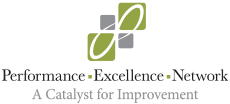
Excellence is About People, Part 2: Achieving Personal & Professional Happiness — PEN April 2019
April 18, 2019
In case you missed it, last month I shared 14 insights, tips, and best practices that leaders can do to create an environment that ensures workforce engagement, team effectiveness and productivity. This month, as part 2 of the of the blog (the proverbial other side of the coin), I’ll share 14 more strategies that we all can do as individuals to ensure our own engagement, happiness and well-being – tips that will make us more productive professionally, but also more productive and fulfilled personally.
Why the two-month, two-part blog focused on people? Because, as I mentioned last month: nothing great is ever achieved without people. Organizations can only achieve great things with highly effective people running them; communities and nations can only achieve without highly engaged citizens and highly effective leaders setting a course for the future; projects, initiatives, task forces, scientific breakthroughs, inventions, and even sporting achievements are all the result of highly effective people and teams. Excellence is defined by, inspired by, created by, and appreciated by people.
That is why we picked it as this year’s theme for the Performance Excellence Network’s annual conference, PENworks 2019 (just two weeks away – a few seats are available!): Empowering People; Achieving Excellence.
And here’s why it matters. Last month, I offered several statistics showing the importance of having highly engaged employees. But it also pays to have happy employees: according to research, happiness can improve professional productivity by 31% and accuracy on tasks by 19%. When people are happy, they tend to solve problems faster and more effectively, they are more collaborative and creative, and they enjoy better response from colleagues and customers alike. And they are healthier: happiness has been linked to better heart and cardiac health, reduced illness, reduce stress and pain, and possibly even longer life.

But here’s the catch: American’s are not very happy. A Time Magazine Harris Poll showed we were at an all-time low for happiness in 2016 at 34% (and there’s a decent chance we’re lower today). So if being happy leads to better health, more success on the job, and overall well-being, what can we do as individuals to maximize our own happiness? Here are some ideas, in no particular order:
- Be more intentional – Dr. Amit Sood of the Mayo Clinic (and PENworks 2016 opening keynote) contends there is a science – and some underlying processes – to achieving happiness. My first four tips are actually his suggestions for systematically improving our happiness. He contends when we take charge and become a more active participant in life (rather than just existing on “autopilot”), happiness and resilience both increase. Intentional living involves carefully choosing your thoughts, words, and actions. Being conscious, deliberate, thoughtful, and intentional will improve your moments, your days, your years, and ultimately your career and your life.
- Focus on having a deeper presence – Most of our presence is superficial, because our attention is often fragmented and weak and that fragmentation usually is because our thoughts and our actions aren’t always aligned. However, when they are aligned, you start seeing patterns in an otherwise random world; you appreciate details you haven’t seen before; you make fewer errors; you can process the abstract and complex. Try this: take just two minutes a day to write about a positive experience you had over the past 24 hours. It will help you move from a task-based thinker to a meaning-based thinker. Not only will it help improve alignment between your thoughts and actions, but it’ll help you more fully engage with people on a more authentic level – to build long-lasting, meaningful relationships (both personal and professional).
- Strive for contentment – Contentment is a deep feeling of fulfillment, created by the continuous practice of gratitude. Every day, write down three things for which you are grateful – research shows this will significantly improve your optimism, happiness, and contentment. In fact, Dr. Sood recommends that you take the first two minutes of every day – before you get out of bed, before you make coffee or read emails or tweets, before you shower or do anything – to visualize five people that mean a great deal to you and virtually send them gratitude. Sounds corny, but it changes your biochemistry and sets an incredible tone for the day. And just being aware of the things for which you are grateful will make you more grateful.
- Be kind – Kindness is really the manifestation of compassion: it is patience; it is forgiveness; it is love; it is humility; it is servant leadership. Kindness is extremely difficult to consistently maintain, especially during times of adversity, stress, anger, or pain (of course, those are the times we need kindness the most). Kindness enables clarity and self-control – it is what prevents you from overreacting during an argument (saying or doing things you later regret). Kindness gives you peace of mind, but think of the impact it also has on the recipients – your loved ones, your colleagues, your friends. Try this: write one, short email first thing in the morning thanking or praising a member of your team. According to Harvard research, this significantly increases your feeling of social support, a key predictor of happiness (and it will do wonders for your colleague – the recipient of the email!).
- Take care of your body and mind – Exercise for (at least) 10 minutes a day. Not only do you gain more physical fitness from this task, but it also reinforces the notion that behavior matters, and it begins to align the physical and the psychological. Also try meditation for just two minutes a day, focusing on your breathing and clearing your head. This reduces cortisol, stress levels, and the fragmentation that often comes from multitasking all day.
- Strive for continuous learning – Nelson Mandela said “education is the most powerful weapon which you can change the world.” And for a more current quote, Jeff Bezos has said “in business, what’s dangerous is not to evolve.” Professional learning is critical to keep the “blade sharp” (borrowing another quote from Steven Covey) – to keep relevant and current with our ever-changing environment, trends, and best practices. It also keeps you sharp, always challenging the status quo, considering new ideas or new ways of doing things. Learning can happen in many ways – in the classroom, online, on the job, or just being well-read. Don’t be complacent; challenge yourself to learn new things. It increases your knowledge and value, and it keeps you stimulated and engaged.
- Take risks – The Baldrige Framework defines “intelligent risks” as “opportunities for which the potential gain outweighs the potential harm or loss [of future success]… if you do not explore them.” Innovation can never be achieved by pursuing only safe, proven endeavors. Take (calculated) chances. Sometimes you’ll win and sometimes you’ll fail. But learn from those mistakes and try again. Churchill once said “success is not final, failure is not fatal: it is the courage to continue that counts.”
- Value diversity and inclusion – Personal differences enhance the world in which we all live, and understanding people – and their cultural heritage, perspectives, and differences – is crucial to personal, organizational, and community growth. Seek to understand differences. Strive to respect all people: every single human has a great deal to offer. On a genetic level, we are all far more similar than we are different, but the differences are what make the world a dynamic, wonderful place. Your happiness – and overall effectiveness, personally and professionally – will increase the more you value diversity and respect all people.
- Set boundaries – Sometimes it’s easy to get into a pattern of overextending ourselves, agreeing to things for which we do not have capacity or true passion for doing. Happier people give themselves permission to say “no” (nicely, of course!). Set limits for yourself and try to stick to them.
- Connect with nature – We are all creatures of this earth, and so many of our remedies are found in nature. Think about it: most of us feel better on a sunny day, or taking a breath of fresh air, or hearing a gentle breeze or rain or rushing water. There are many biological (and psychological) reasons for this, but the bottom line for us all: get outside! Go for a walk; read a book at the park; take a nap at the lake. Nature seems to naturally recharge most of us.
- Make a bucket list – Having something to look forward to seems to lift our spirits. Think about your last vacation (or holiday gathering or special event you attended) – the anticipation and positive energy you had leading up to it. Research shows that we all benefit from thinking positively about the future, so go ahead and dream!
- Practice affirmations – Similarly, research shows that people who practice positive affirmations – making statements or propositions that are declared to be true – increase certain brain activity associated with self-worth and valuation. Try it! Come up with three or five positive things to say about yourself (such as “I am successful on the job,” or “I am healthy,” or “I have a wonderful life”), repeating them in the morning and then again before bed. Yeah, it feels a little like Stewart Smalley from Saturday Night Live, but research shows it will increase your self-esteem and help to program your subconscious to be more positive.
- Think positive – Learn to find the positive in things – not just about yourself (as with affirmations), but about the world and your circumstances. We’re all human, so we all have negative thoughts – worrying, self-judgment, fearing rejection, and so forth. While those thoughts probably have sustained the species for tens of thousands of years, they can be toxic and self-fulfilling. When you have a negative thought, stop, take a deep breath (really, breath), and try to refocus your thoughts on something more positive – try to find the silver lining even in a bad situation. Over time, you’ll train your brain to gravitate toward the positive. Shifting from negative to positive will improve your happiness, but also your ability to cope with stress and your overall resiliency.
- Find your purpose – We all strive to make some sort of impact in the world, either at work, with our families, as a volunteer, or in other ways. To truly be happy, everyone needs to find a sense of purpose and then nurture and cultivate that purpose. My August 2017 blog focused on a Japanese concept called Ikigai, which is the intersection of your passion, mission, profession, and vocation (and PEN partner Irene Kelly led a breakfast discussion a few months later on the same topic). If you can find your life’s true purpose and align it with what you’re good at and what the world needs, well, you will have found your Ikigai.

There you are: 14 tips to improve your happiness, well-being and personal effectiveness. So pick a tip and try something new – maybe one a day for the next two weeks. I’m sure you’ll feel a shift in your own happiness.
Speaking of two weeks, if you haven’t already registered, considered coming to the PENworks 2019 conference: Engaging Employees, Achieving Excellence. Keynotes Jenn Lim (of Delivering Happiness and formerly of Zappos), Jeff Brown, and Stevie Ray will explore what each of us can do as leaders and professionals to be more effective on the job, to ensure our own professional engagement, and to increase our (professional and personal) happiness.
What other insights/tips do you have on workforce engagement or effectiveness? Participate in a discussion on this topic: visit our LinkedIn group to post a comment.
Never stop improving!
Brian S. Lassiter
President, Performance Excellence Network
www.performanceexcellencenetwork.org
Catalyst for Success Since 1987!
Photo credits Lassiter, BBC

